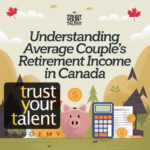How Much Money Do You Need to Retire in Canada?

Planning for retirement can seem overwhelming, especially when considering how much money you’ll need to retire comfortably in Canada. This guide will provide you with clear insights into the expenses you’ll face, potential income sources, and actionable steps to help you prepare financially for your retirement years.
Understanding Retirement Expenses
The first step in determining how much money you’ll need to retire is assessing your expected expenses. A widely accepted benchmark is to aim for 70% to 80% of your pre-retirement income to cover housing, healthcare, and day-to-day living costs. For instance, if your pre-retirement income is $75,000 per year, you should aim for an annual retirement income of approximately $52,500 to $60,000.
Major Retirement Expenses to Consider
Housing Costs:
- Mortgage or rent payments
- Property taxes
- Home insurance
- Maintenance and repair costs
Healthcare Costs:
- Prescription medications
- Private health insurance premiums
- Out-of-pocket medical expenses
Daily Living Expenses:
- Groceries
- Utilities
- Transportation costs
Leisure Activities:
- Travel and vacations
- Hobbies and entertainment
Contingency Fund:
- Emergency home repairs
- Unexpected medical expenses
By evaluating these factors, you’ll have a clearer picture of your future needs. For a detailed breakdown of potential costs, you can refer to our Retirement Planning Guide for Canadians. It’s essential to plan based on your personal needs to ensure a secure retirement.
How Much to Save for Retirement
One of the most common questions is, “How much money do I need to retire in Canada?” The answer depends on factors like lifestyle, location, and financial goals. A general rule of thumb suggests having at least $1 million saved by the time you retire. However, this number can vary significantly depending on where you live. For example, retiring in a large city like Toronto or Vancouver might require a larger retirement fund than living in a smaller town.
Government Benefits and Their Impact on Retirement Savings
Government programs such as the Canada Pension Plan (CPP) and Old Age Security (OAS) are essential components of retirement income in Canada. They can help supplement your savings and reduce the overall amount you need to set aside.
- Canada Pension Plan (CPP): The average monthly CPP payment is approximately $1,200.
- Old Age Security (OAS): Eligible seniors receive around $615 per month from OAS.
These government benefits play a vital role in your financial planning. To determine how much more you need to save, subtract these amounts from your estimated retirement expenses. This approach will give you a more accurate figure for your personal savings goals.
How Much Money is Required to Retire?
The question of how much money you need to retire is often more complex than a single number. To calculate your retirement savings goal, you should follow a systematic approach that includes your projected expenses and expected income sources.
Steps to Calculate Your Savings Target:
- Calculate Your Total Annual Expenses: Start with an estimate of your annual expenses during retirement, including housing, healthcare, and living costs.
- Determine Your Income Sources: Estimate how much you’ll receive from government benefits (like CPP and OAS), pensions, or part-time work.
- Subtract Your Income from Your Expenses: This will give you the annual shortfall you’ll need to cover with your personal savings.
- Calculate the Total Amount Needed: Multiply your annual shortfall by the number of years you expect to live in retirement. For example, if you have a $20,000 shortfall per year and expect to live 25 years in retirement, you will need $500,000 in savings to fill the gap.
For a more detailed method of determining your retirement needs, check out our article on calculating retirement income.
Recommended Retirement Savings by Age
Knowing how much to save at different stages of your life can help you stay on track for retirement. Financial experts recommend setting savings milestones to ensure you’re financially prepared when the time comes to retire.
Savings Targets by Age:
- By Age 30: Save at least 1x your salary.
- By Age 40: Target saving 3x your salary.
- By Age 50: Aim for 6x your salary.
- By Age 60: Save 10x your salary.
For example, if you earn $80,000 annually, by age 60, you should have around $800,000 saved. This savings goal provides a solid foundation for a comfortable retirement. If you’re looking for more information on retirement savings strategies at different life stages, check out our comprehensive guide on saving for retirement.
How Much Do You Need to Retire Comfortably?
Retiring comfortably means being able to maintain your current lifestyle without major adjustments. The amount you need to save will depend on how you want to live in retirement.
Tips for a Comfortable Retirement:
- Start Early: Begin saving as soon as possible to maximize the benefits of compound interest.
- Diversify Investments: Spread your investments across a mix of assets like stocks, bonds, and real estate to minimize risk.
- Review Regularly: Reassess your retirement savings plan annually and adjust based on changes in your financial situation.
- Seek Professional Guidance: Consult with a financial advisor to tailor your retirement strategy to your specific needs and goals.
For more details on ensuring a comfortable retirement, read our retirement planning strategies.
Conclusion
In summary, determining how much money you need to retire in Canada depends on several personal factors, including lifestyle, location, and income sources. While aiming for around $1 million in savings is a good starting point, you must consider your unique retirement goals and government benefits like CPP and OAS.
Trust Your Talent and take proactive steps to plan for your financial future. By leveraging expert advice and staying committed to your savings goals, you can secure a financially sound and enjoyable retirement. For more resources, explore our full Canadian Retirement Planning Guide and get expert insights to help you build a successful retirement plan.





